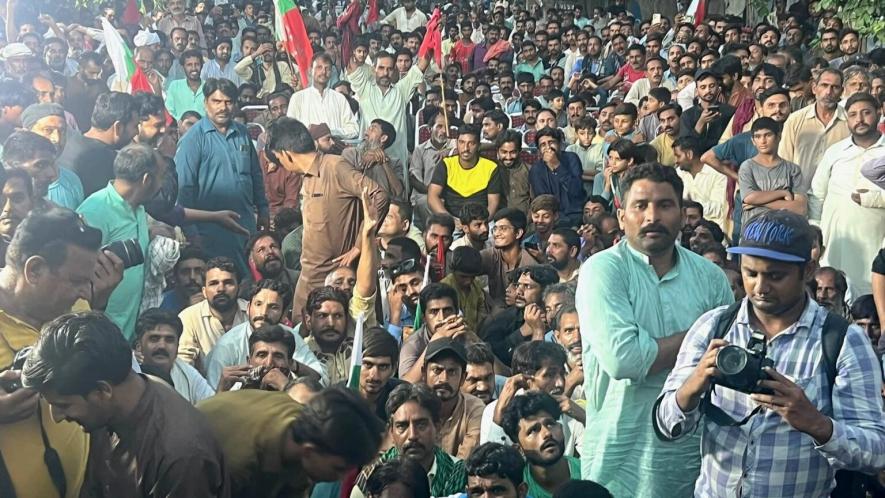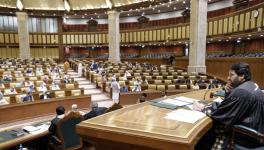Pakistan: Textile Workers Demand Better Wages, Labour Rights

Workers' protests in Faisalabad. Hundreds of workers resisted state repression to demand minimum wage. Photo: Ammar Ali Jan
Workers in the textile factories in Faisalabad, Gujranwala, and several other parts of Pakistan’s Punjab province have been protesting for weeks now demanding a better minimum wage in the country.
In Faisalabad, led by Haqooq-e-Khalq Party (HKP) and other unions, hundreds of workers successfully carried out a large strike on August 3 and have been regularly organizing large-scale protest gatherings to push for their demands.
The workers’ demands include a better minimum wage, the proper implementation of labor and minimum wage laws, and the protection of other workers’ rights.
Before Faisalabad, textile workers in Gujranwala observed a strike in support of similar demands, which lasted for more than a fortnight. The strike was lifted after the administration and the factory management agreed to all the demands.
The strike in Faisalabad started on August 1. HKP has alleged that, following the announcement of the strike, several factory owners locked their factories instead of talking to the workers and considering their demands.
Despite the pressure and threats, the workers are united and determined to continue their movement until all their demands are met, HKP has claimed.
Hundreds of workers are on strike in Gujranwala and Faisalabad against government failure to implement labour laws. Minimum wage is not being adhered to, while prices of basic commodities skyrocket. Workers’ struggle will only intensify in the face of the government’s apathy. pic.twitter.com/Izk2e7Me9r
— Ammar Ali Jan (@ammaralijan) July 23, 2025
A large meeting of protesting workers was held on August 7, which was addressed by Baba Latif Ansari, state president of HKP; Ammar Ali Jan, leader of the HKP, and others. The speakers highlighted the need to continue the struggle against the joint forces of factory owners and the state. They also underlined the need for a nationwide movement for decent minimum wages and the protection of other labor rights.
Joined the inspiring ongoing power loom workers strike in Faisalabad yesterday with @ammaralijan, @HaiderSalma_ & others. Textile barons have locked workers out of factories rather than pay them living wages. We need a countrywide workers uprising for fairer wages & taxes. pic.twitter.com/w6qVv9y9YC
— Ammar Rashid (@AmmarRashidT) August 7, 2025
Another meeting was organized on Saturday, August 9, which was addressed in solidarity by Salman Akram Raja, leader of Pakistan’s main opposition party, Pakistan Tehreek-e-Insaf (PTI).
A living wage
Trade union movements and left political parties in Pakistan have accused the governments in the country of deliberately neglecting workers’ interests in order to keep big capitalists at home and abroad happy.
Despite the rising cost of basic commodities such as food, clothing, electricity, and health care, the minimum wage remains low in the country, forcing the majority of the workers to live in poverty, unions claim.
HKP, along with other unions, submitted a charter of demands to the Punjab government before the budget preparation and demanded that the minimum wage be raised to at least Rs. 70,000 (USD 246).
Baba Latif also questioned the failure of the governments to establish a decent minimum wage, accusing it of working in the interest of big capitalists and basing policy decisions on the conditions of the IMF.
However, despite the pressure from the trade unions, the Punjab government, led by Maryam Nawaz, proposed in June a meager raise to the state’s minimum wage, from the current Rs. 37,000 (130 US dollars) to Rs. 40,000 (USD 141) per month.
HKP and other unions rejected the announced minimum wage, calling it grossly inadequate.
Supporting the ongoing movement in Faisalabad, some civil society groups and trade unions held a press conference in Lahore last week. They demanded that the legal minimum wage in the country be increased to Rs. 75,000 (USD 264), claiming anything less would not qualify as a “living wage”.
They claimed that the announced minimum wage of Rs. 40,000 is only half of the actual “living wage” required for a worker to run his/her family, given the cost of living in the country.
The activists claimed that since Pakistan is a signatory to the International Labor Organization (ILO) conventions, it must implement labor codes and wages that meet international standards.
Courtesy: Peoples Dispatch
Get the latest reports & analysis with people's perspective on Protests, movements & deep analytical videos, discussions of the current affairs in your Telegram app. Subscribe to NewsClick's Telegram channel & get Real-Time updates on stories, as they get published on our website.
























